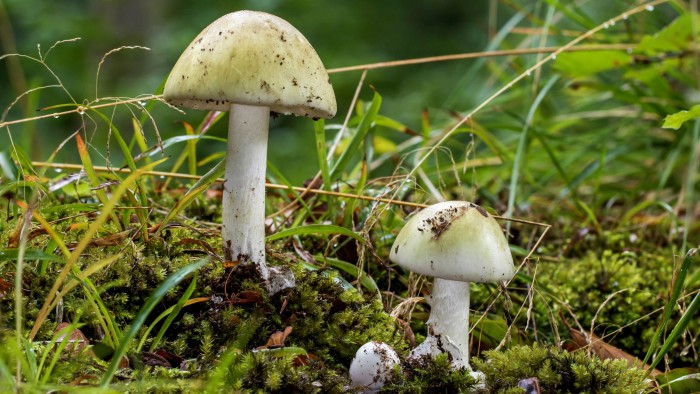Stay informed with free updates
Simply sign up to the Life & Arts myFT Digest — delivered directly to your inbox.
Getting the family round for a bountiful springtime lunch can be a fraught affair: will the lamb be ready on time? Will that tortuous row between your spouse and your brother kick off again? Will you accidentally poison your loved ones with those mushrooms you foraged for the main course? Unless, of course, a touch of toxicity was always on the menu.
A court in Victoria, Australia, is currently trying 50-year-old Erin Patterson on murder charges for feeding her in-laws an innovative take on the beef Wellington, made with death cap mushrooms. When the taxonomists were naming that one, they weren’t mucking about. Death caps contain a poison called amanitin which, according to the UK’s Woodland Trust, is responsible for 90 per cent of all fatalities caused by ingesting fungus. The wife of Roman emperor Claudius was said to have killed him with a dose of death cap juice; Voltaire claimed it was death cap poisoning which did for the Holy Roman Emperor Charles VI.
Patterson had allegedly invited her estranged husband’s mother, father, aunt and uncle to lunch to discuss with them a cancer diagnosis of which no evidence has been found. The four guests were subsequently hospitalised and three later tragically died. The case, which seemingly has attracted more global attention than the recent Australian elections, shines a spotlight on many things: the complexities of family dinners; the technical skill required to make a beef Wellington; and of course, the dangers attached to foraging. Patterson claimed that she had bought the mushrooms used in the dish and that the deaths were a “terrible accident”, though her lawyer said that she had lied to police about never foraging for mushrooms.
The many cheerleaders for foraging, which includes a raft of Michelin-starred chefs for whom self-picked ingredients provide a thin veneer of authenticity, will be watching the case closely. If Patterson is found guilty, it will obviously be all her fault. They can breathe a sigh of relief. But if she’s acquitted it will mean the killer was actually mother nature; admittedly aided by ignorance, but nevertheless foraging itself will be in the dock. That really isn’t brilliant marketing for a pastime intended to celebrate the innocent joys of the great outdoors. The fact is, dear mother nature isn’t always the sweet, nurturing soul we want her to be. In 2023 US poison centres saw an increase of more than 10 per cent in the reporting of potential mushroom poisoning cases, while Public Health England has standing advice online designed to dissuade inexperienced foragers from ending lunch with a trip to intensive care.
And yet for all the dangers, it appears to be increasingly popular, with Wild Food UK, which runs courses, reporting ever greater interest. For some stony hearted city dwellers who, as Mark Twain allegedly said about golf, might regard foraging as a good walk ruined, it’s inexplicable. Far better to get food from shops which slap helpful labels on ingredients and don’t generally sell toxins. Why tramp through muddy undergrowth to find wild sorrel which tastes pleasingly of lemon, when you could just buy a lemon? Why go hunting for sweet cicely which apparently has back notes of liquorice, when you could buy some actual liquorice? Apart from the fact that you won’t risk poisoning yourself, you’ll also be supporting hard-pressed farmers.
That is to misunderstand the appeal of foraging. For many, it’s seen as a direct reaction against the growth of industrial-scale agriculture. In 1987 the popular academic Jared Diamond published a paper in Discover magazine, which has since become a key text for the movement. It described agriculture as “The Worst Mistake In the History Of The Human Race”. It wasn’t, he said, the great driver of human intellectual and social progress as had been argued by many, but the cause of “gross social and sexual inequality, the disease and despotism, that curse our existence”. The Mesopotamians must have felt right chumps when they read that.
Putting aside the moot question of whether humanity took a desperate wrong turn on the banks of the Nile 9,000 or so years ago, it’s perhaps worth considering the implications of foraging becoming the default way of feeding ourselves. Yes, it would reconnect us with nature. Yes, it would get us all a lot more exercise. But the natural world, what’s left of it, would quickly suffer environmental collapse and an awful lot of people would starve. Plus, of course, there is the genuine risk of accidental poisoning. So, if you’re invited for lunch by a loved one this weekend, and they tell you enthusiastically that they foraged your main course themselves, take my advice: ask a few pointed questions about what they think they picked before getting stuck in.
Jay Rayner is the FT’s restaurant critic
Find out about our latest stories first — follow FT Weekend on Instagram, Bluesky and X, and sign up to receive the FT Weekend newsletter every Saturday morning
